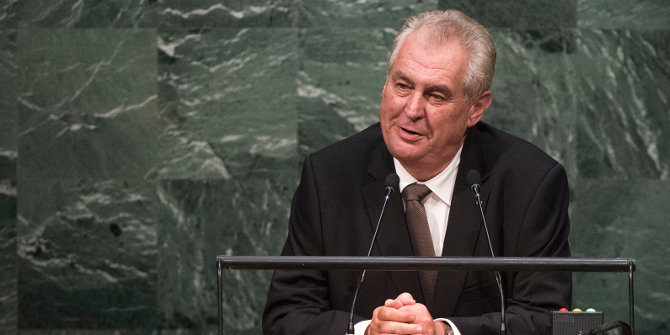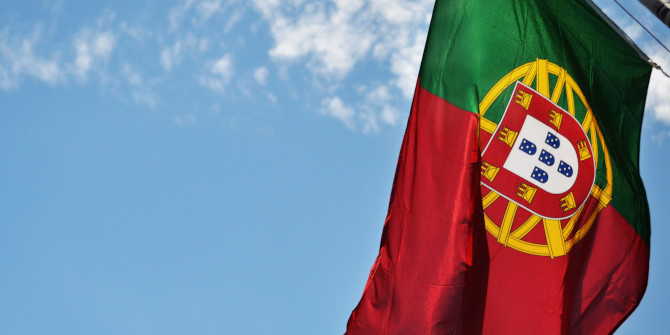
 The European elections in Latvia will come shortly after the country’s last general election, which took place at the end of 2018. As Licia Cianetti and Ryo Nakai explain, the general election signified a major change in the Latvian party system, with three new parties winning almost half of the votes. The upcoming elections on 25 May will likely continue the trend of high electoral volatility.
The European elections in Latvia will come shortly after the country’s last general election, which took place at the end of 2018. As Licia Cianetti and Ryo Nakai explain, the general election signified a major change in the Latvian party system, with three new parties winning almost half of the votes. The upcoming elections on 25 May will likely continue the trend of high electoral volatility.
Latvia’s European elections will be held on 25 May. They will take place just seven months after the last general election, amidst significant political turmoil. The general election on 6 October last year saw three newcomer parties win almost half (45%) of the parliamentary seats. This set off long coalition negotiations lasting over 100 days, which resulted in a potentially unstable five-party coalition government.
The coalition is led by the established (but declining) New Unity party, and includes the nationalist (and often in government) National Alliance, and all three new parties, the New Conservative Party (Jaunā konservatīvā partija, JKP), Development/For! (Attīstībai/Par!, AP), and Who Owns the State? (Kam pieder valsts?, KPV). Like every election since 2011, the ethnic party representing the Russian-speaking minority (Harmony) won the most votes but was excluded from coalition talks.
The ousting of Riga’s first Russian-speaking mayor from his mayoral post for financial irregularities and upcoming (indirect) presidential elections further complicate the scene. The European elections will take place in a context of high volatility and will be a testing ground for all Latvian parties, new and old.
Since the centre-right Unity party (an EPP member) won half of the seats in the last European Parliament elections in 2014, its popularity has fallen sharply and in the 2018 general election – under the new name “New Unity” – it received only 6.7% of the vote (down from almost 22% in 2014). Such volatility is not new in Latvian party politics, partly because ethnolinguistic cleavages tend to be more salient than structured socioeconomic cleavages.
This “ethnic hollowness” makes it difficult for moderate centre-right or centre-left political parties (usually appealing through economic policies) to keep long-lasting stable electoral support, and it creates room (especially on the “Latvian” side of the party spectrum) for new and “semi-new” parties (with new names but some old faces) to challenge incumbents and claim a high share of the votes.
All three newcomers did very well in the 2018 elections by running on an anti-establishment and pro-change platform, albeit with a different “flavour”: socially conservative and nationalist for the JKP, liberal and leftist-libertarian for the AP, and “pure” populist with right-leaning elements for the KVP, whose style of populism has sometimes been compared to Italy’s 5-Star Movement.
None of these new parties have any affiliations in European parties yet. In addition to the three newcomers, Latvia’s more established parties will be contesting the elections: the nationalist National Alliance (an ACRE member), the rural-based oligarchic Green and Farmers Union (Zaļo un Zemnieku Savienība, ZZS; no European affiliation), and the ethnic Socialdemocratic Party Harmony (S&D member). Latvians will be able to choose from a total of 16 parties, two more than in 2014.

Riga, Credit: Naval S (CC BY-NC 2.0)
One of the key political disputes that is likely to have high resonance over the European election campaign regards Harmony’s leader Nils Ušakovs. Since 2009, Ušakovs has been mayor of the capital city Riga, where almost one-third of Latvia’s population lives and ethnic Latvians make up less than 50% of the residents. Over a decade the “Russian mayor” has succeeded in keeping his popularity high among locals by expanding government expenditure and through his careful use of communications and social media.
However, several major corruption and graft scandals, especially related to Riga’s transportation department (Rīgas Satiksme) have appeared almost daily on the front-pages of local and national newspapers this year. After the Latvian anti-corruption bureau officially started an investigation into allegations of financial irregularities and corruption, with Ušakovs among those risking charges, Ušakovs suddenly announced his candidacy for the European Parliament elections. Many observers have commented that this move to Brussels (he is almost certain to be elected) is a way of trying to gain immunity by being a MEP or at least – since the European Parliament has a record of voting in favour of lifting immunity to allow investigations on MEPs by member states – to get out of Riga before formal charges are filed and wait for the dust to settle.
In a surprising twist, on 5 April, the Minister of Environmental Protection and Regional Development Juris Pūce (AP) dramatically announced that the cabinet will dismiss Ušakovs from his mayoral post and Prime Minister Krišjānis Kariņš (New Unity) supported him. Ušakovs has refused to move out of his mayoral office and has announced that he is going to appeal the dismissal. Although Pūce stressed that his decision was not politically motivated, the timing of the dismissal so close to the European elections is likely to make this dispute central to the pre-electoral debate.
Recently, provocative stickers portraying Ušakovs being arrested by Nazi soldiers because of being Russian (tāpēc, ka krievs) appeared in Riga and this case is now under police investigation. This showdown between the government and Riga’s local government is likely to colour the upcoming political campaign, potentially increasing the salience of ethnolinguistic divisions.
Just after the European elections, in June 2019, Latvia’s parliament will hold the indirect election of Latvia’s President, for the first time with an open ballot. All coalition parties have declared their support for the candidacy of Eglis Levits, a renowned jurist with nationalist and socially conservative leanings but who enjoys wider support among Latvia’s intelligentsia. While his election seems all but certain at the moment, major upsets in the European elections might change the political calculations for some of the coalition parties.
The latest polls (here and here and here) place Harmony in first or second place but on a downward trend, which suggests that its bid for two out of Latvia’s eight MEP seats (up from one) might once again be frustrated. While Harmony has consistently been the largest party in parliament since 2011, they have fared worse in European elections. They were the second party in 2009 (2 MEPs), and in 2014, although most polls had placed them as the likely winner, Harmony came only a distant third (1 MEP), after the party of government Unity and just below National Alliance.
The other “veteran” parties that are in with a chance to win seats are ZZS, which would look at success in these European elections as further proof of their resurgence after the fall from grace of the “oligarch parties” in 2011; National Alliance – whose support is declining according to the polls but might still be enough to snatch one MEP; and New Unity (Jaunā Vienotība, JV). Led by European Commission Vice-President Valdis Dombrovskis, JV hopes to repeat the feat of the last European elections (when Unity got an unexpected 46% of the vote and 4 out of 8 seats) but is currently expected to get no more than two MEPs.
New parties have had a way of getting surprisingly good results and then sharply deflating in subsequent elections, so it is not a given that the three new entries of the 2018 elections will retain their support in the European elections. The downward trajectory in the polls for the star of the latest parliamentary elections, KPV, seems to follow this trend. Of course, polls are to be taken with a pinch of salt (and they could be wide of the mark as in 2014), but what seems evident is that the European elections will be in line with the increasing fragmentation noted in the last parliamentary elections.
The dismally low turnout of the 2014 European elections – 30%, down from 53.7% in 2009 – adds to the unpredictability. The outcome will hang not only on each party’s ratings among Latvians but also on turnout and how successful each party will be in mobilising their own core electorate (in 2014 Harmony was particularly bad at bringing out their core voters).
With only eight seats to distribute, the fragmentation of the party landscape means that small differences in the result will make a lot of difference to the distribution of seats, and at the time of writing each party is expected to get no more than one or two seats. The focus is therefore on the names of the few hopeful candidates at the top of the main parties’ lists (for a useful review of the key names see here).
Beyond some obvious names (like Dombrovskis) and some curiosities – like the trend for Latvian political scientists to try their hand at politics and the presence on a minor party’s list of a German AfD Bundestag member – the big story of these elections is that Ušakovs will be leading Harmony’s list. He had announced his candidacy in the midst of the Rīgas Satiksme scandal and before his dismissal and, bar some major upset, he will be moving to Brussels. Once again, the “Russian vote”, that is solidly behind Harmony in national elections, is likely to be split in European elections where the more radical ethnic party Latvian Russian Union has a good chance to reelect the long-time MEP Tatjana Ždanoka.
As the campaign is still gathering steam, key themes are still to emerge. While Harmony’s programme is centred on social-democratic goals (EU-wide minimum pension and minimum wage) and New Unity’s focuses on security and the “credibility dividend” of Dombrovskis’ experience, the new parties might once again be able to take control of the campaign themes as they did in the recent national elections.
Something that might set Latvia apart from most other European member states is that Euroscepticism does not seem to be a central theme for this campaign. Of the “old guard” parties, the National Alliance is the one with the outlook that is closer to other European far-right parties but it has so far not joined in on the Eurosceptic bandwagon (the advantages of a close alignment with Europe in the face of defence concerns related to the Russian Federation might be the reason).
The ZZS has long been on the fence on European issues and its programme for these European elections keeps this ambivalence by celebrating European nation states’ “patriots”; however, it has not gone full-Eurosceptic so far. The three new “populist” parties also don’t seem set to join the files of the EP Eurosceptics. The AP is strongly pro-EU and supports a federal Europe. The JKP and KPV, although their vision of Europe is less federal and more a union of nation states, have so far not put Latvia’s EU membership under question.
Therefore, whatever the results (and bar some unexpected twists that boost the tiny Eurosceptic parties that did so dismally in the elections just a few months ago), Latvia is unlikely to contribute to the feared surge of Eurosceptic MEPs in the next European Parliament.
Please read our comments policy before commenting.
Note: This article gives the views of the authors, not the position of EUROPP – European Politics and Policy or the London School of Economics.
_________________________________
 Licia Cianetti – Royal Holloway, University of London
Licia Cianetti – Royal Holloway, University of London
Licia Cianetti is Leverhulme Early Career Fellow at Royal Holloway, University of London. Her book on Estonian and Latvian politics, The Quality of Divided Democracies: Minority Inclusion, Exclusion, and Representation in the New Europe, was published in 2019 by University of Michigan Press. Her current research deals with the fate of European “multicultural cities” under the double pressure of austerity and resurgent nativism.
 Ryo Nakai – University of Kitakyushu
Ryo Nakai – University of Kitakyushu
Ryo Nakai is an Associate Professor in the Department of Policy Studies at the University of Kitakyushu, Japan, and serves on the international advisory board for the Journal of Baltic Studies. His research interests are on elections, party politics, ethnopolitics, nationalism, and social survey. He is on Twitter: @rnakai88





